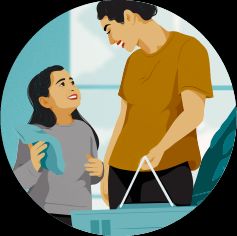Alcohol use can worsen symptoms of depression, mania, or hypomania if you have bipolar disorder. Understanding what alcohol does to your condition and discussing it with your doctor can help you maintain better health and well-being.
Limiting or avoiding alcohol may help reduce symptoms of bipolar disorder and support your health.
Limiting or avoiding alcohol can also prevent alcohol use disorder, which is a pattern of alcohol use that can impair your mental and physical health, day-to-day activities, and relationships.
Avoiding alcohol entirely is your safest option. If you do drink, it’s important to limit the amount of alcohol you consume and avoid combining it with other substances, such as cannabis.
Read on to learn more about the risks of drinking alcohol when you have bipolar disorder.
Bipolar disorder raises your risk of alcohol use disorder. Alcohol use disorder is a pattern of alcohol use that causes distress or impairs your ability to function at work, school, home, or in other areas of life.
According to a 2020 review, 24% to 44% of people with bipolar disorder have developed alcohol use disorder at some point in their life.
People with bipolar disorder also have an increased risk of other types of substance use disorders, such as cannabis, cocaine, or opioid use disorder. Alcohol use disorder and other substance use disorders often occur together.
You’re
- a family history of alcohol use disorder
- a history of trauma
- high levels of stress
Drinking alcohol may cause mood symptoms to worsen if you have bipolar disorder.
In a
Roughly 42% of participants had a history of alcohol use disorder.
The study notes that past research has shown alcohol use disorder may raise the risk of:
- more severe bipolar disorder symptoms
- rapid cycling between mood episodes
- social challenges
- suicidal behavior
Even occasional drinking might cause mood symptoms to get worse.
Alcohol use increases impulsivity, which is a tendency to act without thinking about the risks or consequences first.
Impulsivity is also a common symptom of bipolar disorder, especially during manic or hypomanic episodes. It may lead to more risk-taking behavior, such as:
- gambling
- substance use
- aggressive behavior
- suicidal behavior
It’s possible that alcohol use might increase impulsivity in people with bipolar disorder, but more research is needed. A
Alcohol may interact with common bipolar medications and increase your risk of side effects, such as:
- drowsiness
- dizziness
- confusion
Some research suggests that alcohol might also make certain antidepressants less effective. Your treatment plan may or may not include an antidepressant, depending on your specific symptoms and needs.
Your doctor or pharmacist can help you learn about the potential side effects and drug interactions of any medications you take. Your doctor may prescribe more than one medication to treat bipolar disorder.
Alcohol use might also affect your memory or judgment and make it harder to follow your treatment plan. For example, you might forget to take a dose of medication or miss a treatment appointment while drinking alcohol or recovering from alcohol use.
Let your doctor know if you have questions or concerns about alcohol use. They can help you learn about the potential risks of drinking and how to manage them. They can also help you recognize the signs of alcohol use disorder and get help when needed.
You might have alcohol use disorder if any of the following statements are true:
- You often drink more alcohol or drink for longer periods of time than you intend to.
- You need to drink larger and larger amounts of alcohol to feel the same effects.
- You get withdrawal symptoms when you reduce or stop your alcohol use.
- You’ve tried unsuccessfully to control or cut down your alcohol use.
- You crave alcohol or have a strong desire to use it.
- You spend a lot of time obtaining alcohol, using alcohol, or recovering from it.
- Your alcohol use interferes with your responsibilities at work, school, or home.
- You’ve reduced or avoided important activities because of your alcohol use.
- You’ve used alcohol in situations where it’s physically dangerous to use it.
- You continue to use alcohol even though it’s negatively affected your social life, interpersonal relationships, or physical or mental health.
Let your doctor or mental health counselor know if you have any of these symptoms. They may recommend behavioral therapy, medication, or a combination of both to treat alcohol use disorder.
Some people need to participate in a medically supervised detox program to manage alcohol withdrawal symptoms, which can be potentially life threatening in cases of long-term heavy alcohol use.
You might also find it helpful to join a support group for people with alcohol use disorder.
You can find more information about treatment and support services by visiting FindTreatment.gov or calling the Substance Abuse and Mental Health Services Administration National Helpline at 800-662-HELP (4357).
Alcohol use can cause symptoms of depression, mania, or hypomania to worsen if you have bipolar disorder. It may also affect your judgment or interfere with your treatment.
People with bipolar disorder have an increased risk of alcohol use disorder, which is a serious condition that can negatively affect their physical, mental, and social well-being.
Let your doctor or mental health counselor know if you think you might have alcohol use disorder or have any questions or concerns about alcohol use. They can help you understand the risks of alcohol use and how to manage them.
Your doctor or counselor may recommend behavioral therapy, medication, or a combination of both to treat alcohol use disorder. You might also find it helpful to join a support group.





